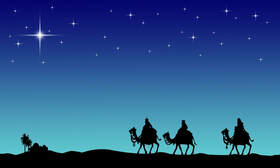
Perhaps we hummed that familiar carol when we set up our Nativity sets this past Christmas season. After all, the Three Kings and their camels are usually the most prominent figures in the set! But how did Three Kings come to be a part of our Christmas/Epiphany celebration? In order to find out, let’s start with Scripture. Please open your Bible and read Matthew 2:1-12, the only Biblical account of the visit by the Wise Men. I’ll pause a moment while you read.
Finished? Okay, now let me ask: “Where in Matthew’s inspired account does it say that the Wise Men (Magi) were Kings? For that matter, where does Matthew say there were three Wise Men?” Please—carefully reread Matthew’s account before answering. Hmm, it looks like Matthew doesn’t call the Wise Men “Kings,” nor does he say there were three of them.
So where did these thoughts come from? Tradition. There were 3 gifts, so many early Christian scholars figured there had to be 3 givers. I'm not so sure. Gold, frankincense, myrrh? Each of these gifts cost a king's ransom. Don't you suppose you might go "halfsies" on gifts so huge?
And kings? Early Christian scholars put several Old Testament prophecies together with Matthew's brief account and came to the conclusion that these Wise Men had to be kings. “Nations will walk to your light, and kings to the brightness of your dawn.” (Isaiah 60:3; see also Psalm 72:10-11) Tradition even gives the 3 kings names: Caspar, Melchior, and Balthazar.
Perhaps. But all Matthew tells us is that these men were Magi (usually translated Wise Men) who came from the East. That term “Magi” is Persian/Babylonian in origin, and it was used to describe a priestly caste of men who were experts in astrology/astronomy and the interpretation of dreams. These men often served as advisors to the king.
But how could astronomers from Babylon--which was some 900 miles away from Bethlehem--have learned about the Savior promised in Numbers 24:17? ”A star will come out of Jacob. A scepter will rise up out of Israel.” Could it have been through the faithful witness of individuals like Daniel, Shadrach, Meshach, and Abednego—Jews who witnessed their faith in Babylon during their captivity? Men who were groomed to serve as the King’s advisors?
Somehow, someway through his precious Word, the Lord enlightened the hearts of the Magi (2 Corinthians 4:6) and moved them to spend weeks, if not months, traversing “afar, field and fountain, moor and mountain, following yonder star.” Until they came to the house (Matthew 2:11), where Joseph, Mary, and the precious child now found refuge. That means the Magi didn’t kneel beside the shepherds in the stable on Christmas night but arrived in Bethlehem some time later. (See Matthew 2:16.)
Isn’t it a miracle of pure grace that the star led the Magi to the child in Bethlehem! Isn’t it a miracle that the Lord, through his Word and sacrament, leads you and me to worship that same child! But just who is this child, the Real Star of Bethlehem? That, at last, we will learn in two weeks. Stay tuned.
Privileged to Serve,
Rev. Glenn Schwanke

 RSS Feed
RSS Feed

